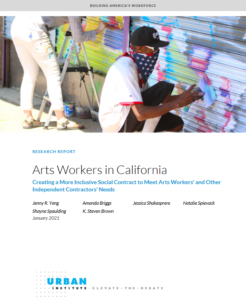March
2021
March 3, 2021
From the Field
Personal and Organizational Policies and Change
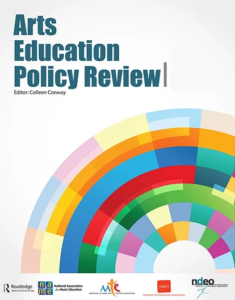 Re-imagining Personal and Organizational Policies as Sources of Radical Change: Perspectives from a Teaching Artist, Organization, and City, written by Tina LaPadula, James Miles and Olisa “Spyc-E” Enrico, integrates stories from the authors’ roles in youth development on the power teaching artists have to disrupt systemic inequality. Each author holds a different position in their Seattle community—teacher, nonprofit leader and municipal administrator—and advocates for the essential role teaching artists play in helping guide education toward equity during times of crisis. This article is part of the newest special edition of Arts Education Policy Review. Edited by Dennie Palmer Wolf and Jeff Poulin, the journal is offering early access to its individual articles until April 30, 2021. Each article focuses on how community based arts organizations and their respective communities have responded to COVID-19. Together, they outline strategies for promoting organizational change, adapting youth development and addressing systemic inequality.
Re-imagining Personal and Organizational Policies as Sources of Radical Change: Perspectives from a Teaching Artist, Organization, and City, written by Tina LaPadula, James Miles and Olisa “Spyc-E” Enrico, integrates stories from the authors’ roles in youth development on the power teaching artists have to disrupt systemic inequality. Each author holds a different position in their Seattle community—teacher, nonprofit leader and municipal administrator—and advocates for the essential role teaching artists play in helping guide education toward equity during times of crisis. This article is part of the newest special edition of Arts Education Policy Review. Edited by Dennie Palmer Wolf and Jeff Poulin, the journal is offering early access to its individual articles until April 30, 2021. Each article focuses on how community based arts organizations and their respective communities have responded to COVID-19. Together, they outline strategies for promoting organizational change, adapting youth development and addressing systemic inequality.
State of the States 2021
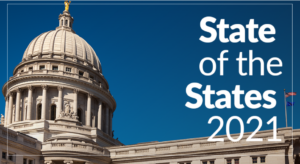 Stateline, an initiative of The Pew Charitable Trusts, has released State of the States 2021, which surfaced five key issues lawmakers are facing as most states begin their legislative session. Going into the 2021 legislative season, policymakers will have to shore up holes in health systems, provide relief for those hurt economically during the pandemic and address systemic racial injustice in policing, health care and incarceration systems—all while contending with a new federal judiciary composition formed by the last administration and upcoming redistricting efforts based on the new census count.
Stateline, an initiative of The Pew Charitable Trusts, has released State of the States 2021, which surfaced five key issues lawmakers are facing as most states begin their legislative session. Going into the 2021 legislative season, policymakers will have to shore up holes in health systems, provide relief for those hurt economically during the pandemic and address systemic racial injustice in policing, health care and incarceration systems—all while contending with a new federal judiciary composition formed by the last administration and upcoming redistricting efforts based on the new census count.
Cultural and Creative Sectors in Post–COVID-19 Europe
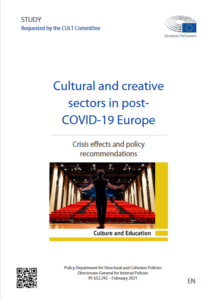 The European Parliament’s Committee on Culture and Education commissioned a comprehensive study into the effects thus far of COVID-19 on cultural and creative sectors in Europe. Researchers analyzed both the direct effects of the health crisis and the indirect pressure to already existing weakness (support for self-employed, part-time or other forms of nonstandard workers) using 416 datasets. The report contains a review of the emergency reports on the sector and provides recommendations for long-term sustainability in arts and culture and guiding principles for future policy action.
The European Parliament’s Committee on Culture and Education commissioned a comprehensive study into the effects thus far of COVID-19 on cultural and creative sectors in Europe. Researchers analyzed both the direct effects of the health crisis and the indirect pressure to already existing weakness (support for self-employed, part-time or other forms of nonstandard workers) using 416 datasets. The report contains a review of the emergency reports on the sector and provides recommendations for long-term sustainability in arts and culture and guiding principles for future policy action.
Accessibility and the Arts
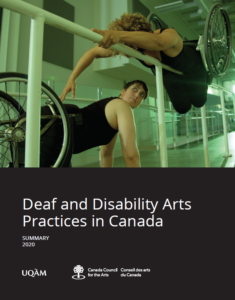 Two new reports address two critical areas of arts and accessibility: access to arts experiences and access to art-making. Accessibility and the Arts: Reconsidering the Role of the Artist, published in part by the Los Angeles County Department of Arts and Culture, investigates the complex responsibility of museums, galleries and the artists themselves to make art accessible. Deaf and Disability Arts Practices in Canada, published by the Canada Council for the Arts, examines the agency and representation of artists who participate in diverse Deaf and disability arts practices. Both reports offer extensive literature reviews, interviews, and a series of recommendations for making arts experiences and arts practices more accessible.
Two new reports address two critical areas of arts and accessibility: access to arts experiences and access to art-making. Accessibility and the Arts: Reconsidering the Role of the Artist, published in part by the Los Angeles County Department of Arts and Culture, investigates the complex responsibility of museums, galleries and the artists themselves to make art accessible. Deaf and Disability Arts Practices in Canada, published by the Canada Council for the Arts, examines the agency and representation of artists who participate in diverse Deaf and disability arts practices. Both reports offer extensive literature reviews, interviews, and a series of recommendations for making arts experiences and arts practices more accessible.
California Arts Workers and Inclusivity
Arts Workers in California: Creating a More Inclusive Social Contract to Meet Arts Workers’ and Other Independent Contractors’ Needs, is a new research report from Urban Institute that delves into the difficulties self-employed and freelance arts workers in California have been facing during the pandemic. The report finds these workers have fewer employment protections and have less access to social insurance programs than full-time permanent employees. The report offers a more inclusive social contract that includes prohibiting worker misclassifications and extending labor protections with social insurance to freelancers and independent contractors.
Impacts of COVID-19 on BIPOC Artists and Creatives
 Two new reports highlight the disparate effects of COVID-19 on Black, Indigenous and/or people of color (BIPOC) artists and creatives. Americans for the Arts (AFTA) has just released The Impact of COVID-19 on Intentionally Marginalized Artists and Creative Workers, its second blog post in an ongoing series. Looking at its survey data, AFTA broke down responses by race and gender to better understand how COVID-19 has affected income, unemployment, savings, retirement funds and the use of crowdfunding among BIPOC creatives. MeWe360, a British nonprofit focused on creative entrepreneurship, has released COVID-19 and the Experience of Black, Asian and Minority Ethnic Creative Entrepreneurs. Although the study draws from a small set of 20 interviews with British artists, it offers broad insight into Black, Asian and minority ethnic creative entrepreneurs dealing with both increased support from the Black Lives Matter movement and the devastating effects of COVID-19.
Two new reports highlight the disparate effects of COVID-19 on Black, Indigenous and/or people of color (BIPOC) artists and creatives. Americans for the Arts (AFTA) has just released The Impact of COVID-19 on Intentionally Marginalized Artists and Creative Workers, its second blog post in an ongoing series. Looking at its survey data, AFTA broke down responses by race and gender to better understand how COVID-19 has affected income, unemployment, savings, retirement funds and the use of crowdfunding among BIPOC creatives. MeWe360, a British nonprofit focused on creative entrepreneurship, has released COVID-19 and the Experience of Black, Asian and Minority Ethnic Creative Entrepreneurs. Although the study draws from a small set of 20 interviews with British artists, it offers broad insight into Black, Asian and minority ethnic creative entrepreneurs dealing with both increased support from the Black Lives Matter movement and the devastating effects of COVID-19.
In this Issue
From the President and CEO
State to State
- Pennsylvania: Equitable Operating Support
- Washington, Vermont: COVID-19 Relief Reporting
- Arizona, Massachusetts: Youth Arts Councils
Legislative Update
The Research Digest
Announcements and Resources
More Notes from NASAA
SubscribeSubscribe
×
To receive information regarding updates to our newslettter. Please fill out the form below.

